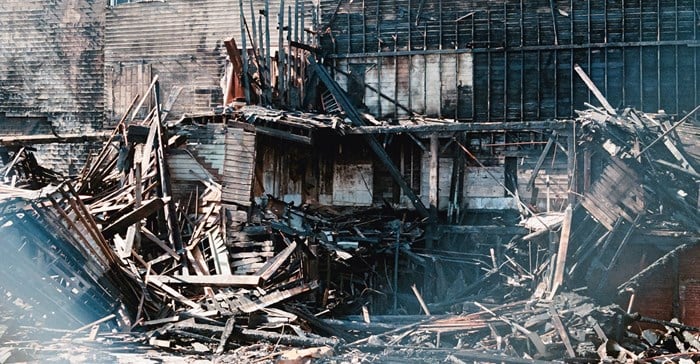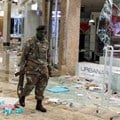Warning to looted businesses: an insurer's liability is never absolute
It is fast becoming a normality to wake up to the reports of fire break outs in South Africa.

Source: UnSplash
Since the July 2021 civil unrest, there have been further major fire break outs.
This year alone, 2022, there have been at least four major fire break outs reported.
At the beginning of this year, there was a massive blaze in Parliament – one of the most important buildings of the State. Few weeks later, the Department of Justice’s building, in Cape Town, was on fire. Thereafter, Durban’s China Mall was engulfed by an enormous cloud of smoke, following another massive blaze. Most recently, another huge fire break out was reported in Durban, relating to the food outlet.
It's worth noting that when shops, malls, motor vehicles, shopping centres and other properties are burnt down to ashes. liability on the part of the insurer is never absolute. By implication, this suggests that a legal dispute between the insurer and the insured business is always a likelihood. It is for this reason, among others, that insured businesses must seek legal advice from insurance-law experts in most of their engagements with insurers and brokers.
When to consult an insurance-law expert?
In some instances, the insurer may not be liable for damages, but the broker is liable. In some cases, the insurer and the broker may be partially liable. Therefore, when your business faces fire damage, consulting a lawyer when a potential claim is imminent or ensues, is of absolute importance. This is undoubtedly worrisome given the devastation that a single fire break out can cause the various insurance clauses that may be triggered as a result.
The ramifications of fire incidents are bound to vary from one to the next. This depends on several factors, inter alia, the cause of fire, the type and make of material in the vicinity, the location of the building from which the fire emanates, and the nature of business.
Thus, in some instances, the damage may be minimal – only limited to a certain section of the relevant building. In some instances, the damage may be moderate, destroying several parts of the building and causing non-severe injuries to persons. In other instances, it may be extreme, burning the entire building down, causing serious bodily injuries to several people and leading to death in the process.
By implication, a single incident of a fire break out can lead to: death of employees, clients and customers; loss of jobs, fire blowing over to nearby businesses; total closure of businesses resulting in business interruption and, total loss of profits. The extent and magnitude of damage is significant as it has direct implications on the clauses of the insurance policy that are triggered, the extent of damage assessment, the likelihood of having the claim(s) repudiated, and if repudiated, what it means for that particular business.
What can fire-damaged businesses claim for?
The most obvious insurance claims that may flow from these incidents are claims for business interruption relating to fire. Most businesses have this kind of cover in place. Also, loss-of-profit claims are likely to flow, and reinstatement of business claims which focus on the replacement or repair of equipment, business structures and buildings.
Where retrenchments result, some businesses have relevant covers in place to assist with the relevant employee packages. These types of claims may also be triggered. In circumstances where personal injuries have transpired, insurance cover for personal injuries will be relevant. Similarly, where death has resulted, the applicable insurance policy will be activated, accordingly.
Depending on the facts and the circumstances of the relevant fire incident, some other affected businesses may sue the particular business from which the fire broke out. The businesses are also able to claim for consequential loss of income from their insurers. Thus, the longer the insurer takes to reinstate the business (where the insurer has to pay), the higher the amount to be paid out.
What if a business is not comprehensively covered?
In cases where a business caught on fire is not comprehensively covered and, thus, unable to claim for certain damage, the wronged parties - namely the injured people, dependants of the deceased and other businesses - may sue the relevant business for damages under the common law. This would be in accordance with the legal principles of the Law of Delict and, consequently, they will need to demonstrate that the unlawful and wrongful conduct of the business has caused them harm. There is a risk if the business is uninsured (at all) or is underinsured, as the wronged parties may be left without a recourse, if the business is not in a financial position to make relevant payments.
Even in cases where a business is comprehensively covered, liability on the part of the insurer is never absolute. The insurer can still escape liability thus leaving the insured business responsible for all the damage caused. Whether the insurer is liable to pay is primarily based on the peculiar facts and the circumstances of the case. Insurers may argue misrepresentation at the time when the insurance contract was entered into. In such a case, the insurer will be able to avoid and rescind the contract.
The contract will be void ab initio – and the insurer will have to repay all the premiums. Most business insurance policies have delicate warranties with which the insured needs to comply. Where, upon the inspection and assessment processes, it transpires that any of the warranties have been neglected, the insurer may successfully raise that, in defence.
When may a dispute fall between an insured business and a broker?
Further, where there was failure to disclose a material fact or information at the time of the insurance review, the dispute may then be left between the insured business and the brokerage firm. It is also common for the insurers to raise the defence of insurance fraud where business-interruption claims arise from fire. These are but some of the possible arguments and defences upon which the insurers may rely, to repudiate a claim. As suggested above, the success of the defence is solely bound upon facts and circumstances of the case.
The recent fires that ensued from the reported civil unrest and arson we're referring to in this context, will most likely lead to businesses submitting various insurance claims.
It will be interesting to see how, if any, litigation ensues, and if litigation ensues, how it will unfold.
As there may be further and more devastating fire break outs in future, this must be even more unsettling for the insurers and insured businesses, alike.
About the author
Mtho Maphumulo is the senior associate at Adams & Adams Lawyers.

